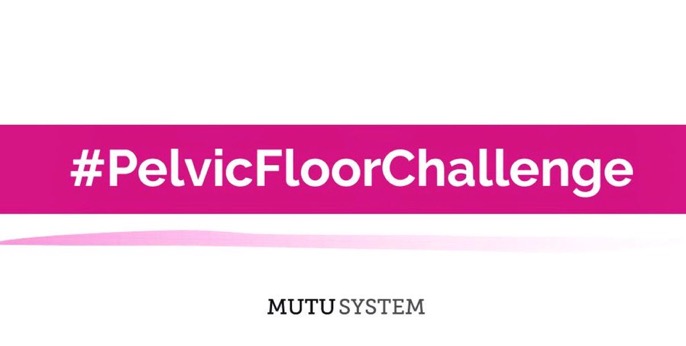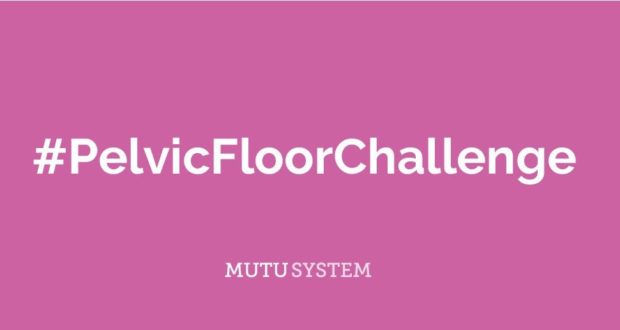
Incontinence and postnatal body issues are major health concerns for women, costing the NHS up to £233 million per year1. They harm women’s dignity, have a huge impact on mental health, and ruin lives for years. However, many women aren’t aware that this misery is avoidable. A new study by MUTU System* shows that these conditions can be improved by women in their own homes, without expensive medical intervention.
As a result, MUTU System has launched a national 30 day #PelvicFloorChallenge campaign from 24th January to encourage women to improve their pelvic floor and open up discussions about postnatal body issues.
50% of women will suffer from incontinence at some point in their adult lives2. For a woman who develops postnatal incontinence in her 30s, this could mean 50 years of bladder weakness.
Contrary to popular belief, this is not an ‘old woman’s problem’. Almost 1 in 4 women between the ages of 18 and 44 experience incontinence7. 37% of women have wet themselves at work within the last month. Of those, 21% wet themselves weekly and almost 1 in 10 daily while at work8.
Designed to combat this and raise awareness of the issue of bladder weakness, the 30 day #PelvicFloorChallenge encourages women around the UK to put six minutes aside each day to start to heal their pelvic floor by following a free to use, step-by-step video guide.
Wendy Powell, CEO of medically endorsed online body recovery programme MUTU System, comments: “For many women, this situation is entirely preventable. With the right information and exercises, women suffering from postnatal issues such as incontinence, diastasis recti, or pelvic organ prolapse can, in most cases, be treated by themselves at home and even have their condition reversed. We hope that the 30-day Pelvic Floor Challenge will help show women what is possible and encourage them to talk about the issue.”
Female health issues, such as incontinence, diastasis recti (abdominal muscle separation), or pelvic organ prolapse, are among the last personal health taboos. The stigma attached makes 75% of women with incontinence suffer in silence9. Those that do seek help take on average 6.5 years10 to do so. This seriously impacts mental health, doubling the risk of postnatal depression11. Sufferers can experience humiliation, fear and anxiety over becoming incontinent in public and distress at others finding out. It can also cause loss of sleep and sexual dysfunction.
Commenting on the impact that physical health conditions can have on women’s mental health, Annie Belasco, Head of PR, Fundraising and Helpline at PANDAS Foundation, said: “As a charity specialising in postnatal and antenatal depression, we understand that the physical demands of pregnancy, birth and motherhood can have a serious impact on women’s mental health. ‘Baby blues’ can be a dangerous assumption of low mood and changing behaviour after having a baby and it is important to raise awareness around this issue, and the physical symptoms that can often be linked to these low moods. We know how closely physical and mental health are linked and that’s why campaigns like MUTU System’s 30-Day Challenge, which encourage mums to take time to care for themselves, are so important.”
In addition to the impact bladder weakness can have on women’s mental health, it is also a costly condition to live with. Women with bladder weakness spend on average £5485 a year on sanitary items and self-care remedies, to deal with the symptoms. This amount is set to rise. It is estimated that the sales of adult incontinence products could equal those of babies’ nappies in the next decade6 as women are increasingly encouraged to buy products that mask the problem rather than treat it.
The available medical options can be daunting and highly controversial. Invasive and expensive treatment options, such as vaginal mesh and vaginal rejuvenation devices are high risk and often unnecessary. In fact, the National Institute for Health and Care Excellence (NICE) has issued draft guidance that vaginal mesh surgery should only be used as a last resort for treating pelvic organ prolapse and urinary incontinence.
Wendy Powell continues: “The high-profile failings of vaginal mesh surgery have put incontinence back in the spotlight, but the sheer number of women needlessly suffering in silence reveals a desperate lack of understanding about available and appropriate treatment options. Women need to know that it doesn’t have to be like that and there are highly effective steps they can take themselves to improve their condition.”
A new study by MUTU System amongst 906* women with varying postnatal body issues, has clearly demonstrated that these problems can be improved.
The research was conducted among women that had engaged with the MUTU System 12-week online body recovery programme which uses a combination of exercises, adjustments and dietary changes to strengthen and heal the body. It found that 92% of women who had experienced bladder symptoms including urinary leakage saw improvement after using MUTU System.
88% of women suffering from symptoms of Pelvic Organ Prolapse reported improvement after using MUTU System. 94% of women with diastasis recti (separation of the stomach muscles) reported an improvement in this condition, and 94% felt an improvement in how they felt about their body and what it is able to do.
Dr Anita Kulkarni a surgeon who specialises in Women’s Health comments: “I see mums in my practice all the time and I always recommend that they start with non-surgical treatment before considering surgery, and the MUTU System is my go-to recommendation.”
Camilla Lawrence, Senior Women’s Health Physiotherapist at Six Physio in London, comments: “Women’s Health Physiotherapists routinely assess and treat Rectus Divarification and Pelvic Floor dysfunction, but there are few really good and safe training systems out there that not only help both these issues long-term but also cover nutrition, posture retraining, general strength and fitness work too – MUTU System really is a complete holistic package. My patients frequently go on to use it after they have finished treatment with me, and love how it takes them to the next level and how it is completely possible to do – even with a baby (or 4!) at home and minimal time on their hands. I can’t recommend it more.”
Wendy Powell comments: “The psychological impact of incontinence is huge. It is unacceptable that women believe they have to live with such distressing symptoms. We feel very strongly that every woman deserves the dignity of a body that works and makes her feel good, and our research has shown that real change can be brought about with the right approach, without the need for expensive, and even potentially dangerous, medical interventions. Women can heal their bodies instead of using sanitary products which simply mask the symptoms and resigning themselves to years of misery.”
To find out more and discover MUTU System’s simple and easy pelvic floor exercise tutorial visit http://www.mydrsentme.co.uk/.
To join in the conversation on social media use #PelvicFloorChallenge
 LBTV A Force for the community…
LBTV A Force for the community…



